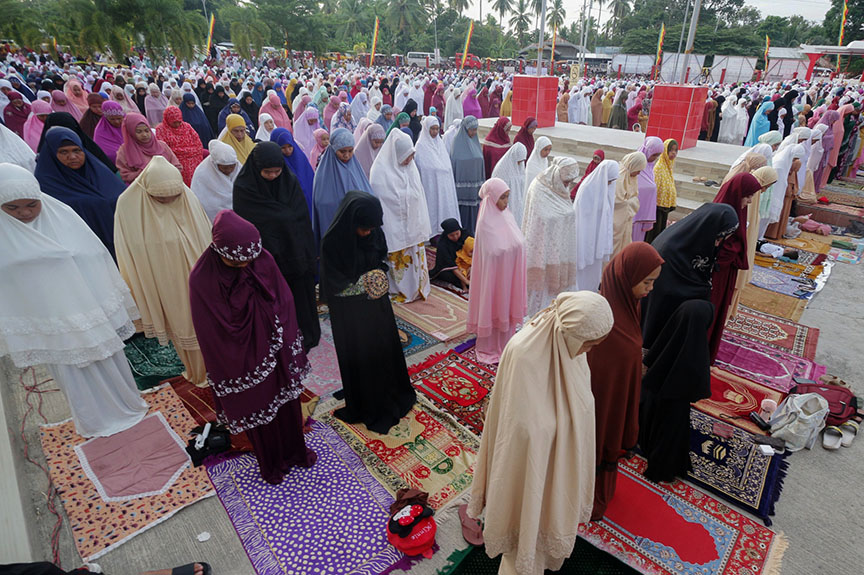GENERAL SANTOS CITY (MindaNews / 10 April)—Eid’l Fitr, as observed today, marks the end of a month-long fasting and celebrates the spiritual strength and endurance that the Almighty gave during Ramadan, said Ustadz Alnor Baghdad Mohammad Tan, an alim from the Mohammad Mosque in this city.
 Hundreds of Muslims gather at the municipal grounds of Pagalungan, Maguindanao del Sur for a congregational prayer during Eid’l Fitr celebrations Wednesday morning (10 April 2024). MindaNews photo
Hundreds of Muslims gather at the municipal grounds of Pagalungan, Maguindanao del Sur for a congregational prayer during Eid’l Fitr celebrations Wednesday morning (10 April 2024). MindaNews photo
Amid the spiritual realizations and rejoicing, Eid’l Fitr is also a time for charity known as Zakat al-Fitr, Tan said.
Zakat, one of the five pillars of Islam, is a religious activity that puts into essence the principle that “Everything in this world belongs to Allah and we are mere stewards of all these,” Tan said on Wednesday.
Cleansing of wealth
Zanjo Martin, a Muslim who works as a teacher at the Mindanao State University (MSU) here, said the Zakat al-Fitr is considered a process of purification and growth of one’s wealth or possessions.
Possessions are purified by setting aside a portion of that wealth for those in need, he said. “It is like pruning a plant. The cut portions grow back bigger and better,” Martin added.
He said that this annual zakat is different from sadaka, gifts of money or in kind given out of generosity. Zakat is a religious obligation of giving a portion of one’s net income each year, to benefit seven categories of recipients.
The seven recipients of Zakat al-Fitr have been listed in the Holy Koran, Martin said.
The Koran states: “Zakat is for the poor and the needy and those who are employed to administer and collect it, and for those whose hearts are to be won over, and for the freeing of human beings from bondage, and for those who are overburdened with debts and for every struggle in God’s cause, and for the wayfarers: this is a duty ordained by God, and God is the All-Knowing, the Wise.” (Qur’an 9:60)
Grand Mufti guidelines
The Bangsamoro Darul Ifta over the weekend released a guideline on how Zakat must be given.
Grand Mufti Abdulrauf Guialani said it is obligatory to all Muslims to give the Zakat al-Fitr as it is stated in the hadith of Ibn ‘Umar.
He said it is much preferable to give basic food items, like the staple rice which can be given at the least 2.5 kilos for every recipient. Aside from rice, Guialani said money can also be given as Zakat.
Nisab sets limit
In giving the Zakat, a Muslim must have enough income to meet a “nisab” that will enable the giver to share 2.5 percent of his or her excess income for the year, Martin said.
Martin said that as a practice, he gives Zakat to relatives, members of the family and neighbors who are very much in need.
“This way, we are able to fulfil our religious obligation and at the same time free friends and relatives from financial burden,” he said.
In giving Zakat, one must keep it to himself or herself, it must not be announced nor tell the recipient that it is a Zakat. The giver must trust that Allah knows about his intentions in giving, he added.
Former journalist now farmer Assam Ulangkaya, a Muslim, said modernity has caught up with Zakat in other countries, where it can be given via online remittance applications.
Period of blessings
Fish trader Marineth Karim, an Ilocana who converted to Islam when she married her Maguindanao husband, said Zakat is purposely to ensure that the vulnerable, the poor and the needy, and the disadvantaged are looked after.
“Zakat makes sure that our help finds a way to those who need it the most,” she pointed out.
In her experiences during Ramadan and in celebrating Eid’l Fitr the past 16 years, Karim said it is true indeed that “While Ramadan is a month for sacrifice, it is also a month of harvest, a period that is full of blessings from Allah.” (Rommel G. Rebollido / MindaNews)
